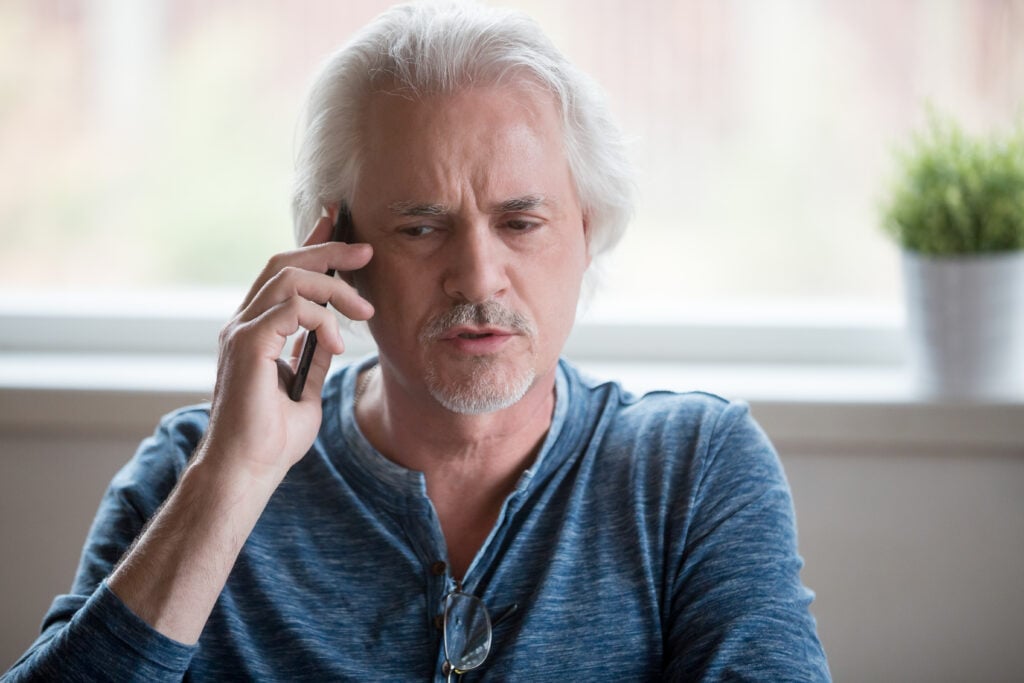They say they’re just enjoying their peace, but the real reason might surprise you.

Older men are disappearing from social circles, and no one seems to be talking about it. You’ve probably noticed it—guys who used to be outgoing now prefer their own company. It’s not just a phase; it’s a growing trend. Some say it’s by choice, others think it’s just part of aging. But is it really?
There’s more to this shift than meets the eye, and the reasons behind it might completely change the way you see social life after 60.
1. They’re tired of shallow small talk and meaningless conversations.

After years of navigating social circles, many older men start to feel drained by surface-level chatter. They’ve had the same “how’s the weather” and “what’s new with the grandkids” conversations a hundred times. If there’s no depth, no real connection, they’d rather not waste their energy. At this stage in life, they crave meaningful discussions that spark curiosity or nostalgia. If they can’t find that, solitude feels like a better option than another conversation about lawn care or golf scores.
2. They don’t feel like they fit in anymore.

The world moves fast, and social norms shift even faster. Some older men feel like their interests, values, or ways of communicating don’t align with the modern social scene. Maybe their old friends have changed, or they don’t vibe with younger generations. Instead of struggling to keep up, they opt out entirely. No one wants to feel like the odd one out at the dinner table, so it’s easier to stay home where they can be themselves without judgment.
3. They’ve lost too many close friends and don’t want to start over.

Losing lifelong friends is one of the toughest parts of aging. As the years go by, the circle of close buddies shrinks, sometimes due to distance, illness, or even death. Making new friends feels exhausting, especially when nothing can replace the bond of those old connections. Many older men decide it’s not worth the effort to rebuild. Instead, they turn inward, choosing nostalgia and solitude over the discomfort of trying to form new relationships from scratch.
4. They enjoy their own company more than they used to.

There was a time when being alone felt boring or even lonely. But now? It feels peaceful. Many older men discover they actually like spending time with themselves—whether it’s reading, fishing, or just sitting on the porch with a cup of coffee. They’ve learned that solitude doesn’t mean loneliness; it can mean freedom. No obligations, no forced conversations—just time to relax and enjoy life on their own terms. Once they get used to that, socializing feels like a chore.
5. They don’t have the energy for forced socializing.

In their younger years, they might have felt obligated to show up at every event, party, or gathering. But as they age, that sense of obligation fades, and exhaustion sets in. The idea of making plans, getting dressed up, driving to a crowded place, and making conversation can feel overwhelming. It’s not that they don’t like people—it’s that they don’t want to use up their limited energy on social events that feel more like obligations than genuine enjoyment.
6. They’ve been burned by too many one-sided friendships.

Nothing is more frustrating than always being the one who reaches out, makes plans, or keeps a friendship going. Many older men have reached a point where they’re done chasing people. If a friendship requires too much effort on their end, they’d rather let it go. It’s not about being bitter—it’s about self-respect. If no one is making an effort to include them, they take that as a sign it’s time to focus on themselves instead of dead-end friendships.
7. They don’t want to deal with drama and negativity.

Socializing comes with baggage—gossip, petty arguments, and unnecessary stress. Many older men have no patience for that anymore. They don’t want to hear about who said what or get dragged into someone else’s problems. At this stage, peace is more important than being socially active. If a group or friendship starts feeling like a source of negativity, they’d rather step away than get caught up in the drama. Silence and solitude beat stress and conflict every time.
8. They feel like they’ve already done their share of socializing.

Some men feel like they’ve spent decades socializing—work events, family gatherings, social clubs—and they’re just done. They’ve had their fill of parties, networking, and making small talk. Now, they see no reason to keep pushing themselves into social situations when they’d rather just relax. There’s nothing they’re missing out on, and they don’t feel the need to prove anything to anyone. It’s not about being anti-social—it’s about feeling like they’ve already checked that box in life.
9. They don’t like how socializing has changed in the digital age.

Gone are the days of dropping by a friend’s house unannounced or spending hours chatting over coffee. Now, socializing is filled with group texts, social media updates, and Zoom calls. For many older men, that shift feels unnatural. They don’t want to text instead of talk or “like” a post instead of catching up in person. Rather than trying to adapt to a world that no longer feels personal, they choose to step away from it altogether.
10. They’ve developed new interests that don’t involve other people.

Hobbies change over time, and for some older men, that means shifting from social activities to solo pursuits. Maybe they’ve taken up woodworking, gardening, or writing—things that don’t require a social group to enjoy. They aren’t avoiding people; they’re just genuinely content doing what they love without needing anyone else to join in. And after years of working and raising a family, it feels good to finally have the freedom to do things just for themselves.
11. They’re frustrated by how much effort it takes to maintain friendships.

Friendships require work—reaching out, making plans, following up. Some older men reach a point where it just feels exhausting. They don’t want to chase people down to schedule a dinner or check in on someone who never reciprocates. It’s not that they don’t care about friendships; they just don’t have the patience for the back-and-forth. If keeping up with friends feels like a full-time job, they’d rather step away and focus on enjoying life on their own terms.
12. They’ve gotten comfortable in their routines.

For many older men, life becomes a series of familiar routines—and they like it that way. They go to the same coffee shop, watch the same shows, take the same walks. Adding social plans into the mix feels like an unnecessary disruption. They don’t feel lonely or left out; they’re just content with the way things are. Once a routine becomes comfortable, stepping outside of it for socializing feels more like a hassle than a pleasure.
13. They’ve realized they don’t need a big social life to be happy.

Society pushes the idea that being social equals being happy. But many older men have realized that’s just not true for them. They don’t need a full calendar or a packed social life to feel fulfilled. They’re happy with a few close connections, their hobbies, and their own thoughts. They aren’t missing out—they’re just living life the way they want to. And for them, that’s enough.
